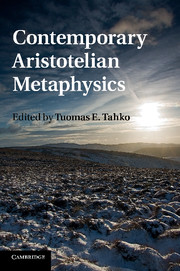Book contents
- Frontmatter
- Contents
- Contributors
- Preface
- Introduction
- Chapter 1 What is metaphysics?
- Chapter 2 In defence of Aristotelian metaphysics
- Chapter 3 Existence and quantification reconsidered
- Chapter 4 Identity, quantification, and number
- Chapter 5 Ontological categories
- Chapter 6 Are any kinds ontologically fundamental?
- Chapter 7 Are four categories two too many?
- Chapter 8 Four categories – and more
- Chapter 9 Neo-Aristotelianism and substance
- Chapter 10 Developmental potential
- Chapter 11 The origin of life and the definition of life
- Chapter 12 Essence, necessity, and explanation
- Chapter 13 No potency without actuality: the case of graph theory
- Chapter 14 A neo-Aristotelian substance ontology: neither relational nor constituent
- References
- Index
Chapter 3 - Existence and quantification reconsidered
Published online by Cambridge University Press: 05 December 2011
- Frontmatter
- Contents
- Contributors
- Preface
- Introduction
- Chapter 1 What is metaphysics?
- Chapter 2 In defence of Aristotelian metaphysics
- Chapter 3 Existence and quantification reconsidered
- Chapter 4 Identity, quantification, and number
- Chapter 5 Ontological categories
- Chapter 6 Are any kinds ontologically fundamental?
- Chapter 7 Are four categories two too many?
- Chapter 8 Four categories – and more
- Chapter 9 Neo-Aristotelianism and substance
- Chapter 10 Developmental potential
- Chapter 11 The origin of life and the definition of life
- Chapter 12 Essence, necessity, and explanation
- Chapter 13 No potency without actuality: the case of graph theory
- Chapter 14 A neo-Aristotelian substance ontology: neither relational nor constituent
- References
- Index
Summary
Introduction
The currently standard philosophical conception of existence makes a connection between three things: certain ways of talking about existence and being in natural language; certain natural language idioms of quantification; and the formal representation of these in logical languages. Thus a claim like ‘Prime numbers exist’ is treated as equivalent to ‘There is at least one prime number’ and this is in turn equivalent to ‘Some thing is a prime number.’ The verb ‘exist’, the verb phrase ‘there is’, and the quantifier ‘some’ are treated as all playing similar roles, and these roles are made explicit in the standard common formalization of all three sentences by a single formula of first-order logic: ‘(∃x)[P(x) & N(x)]’, where ‘P(x)’ abbreviates ‘x is prime’ and ‘N(x)’ abbreviates ‘x is a number’. The logical quantifier ‘∃’ accordingly symbolizes in context the role played by the English words ‘exists’, ‘some’, and ‘there is.’
This view about how to represent or regiment these kinds of sentences will be familiar to philosophers; so familiar, in fact, that for many it will be taken as an established result. I think it should not be taken in this way, and my aim in this paper is to disentangle a number of different claims contained in this standard view, and to dispute some of them.
Keywords
- Type
- Chapter
- Information
- Contemporary Aristotelian Metaphysics , pp. 44 - 65Publisher: Cambridge University PressPrint publication year: 2011
- 5
- Cited by

